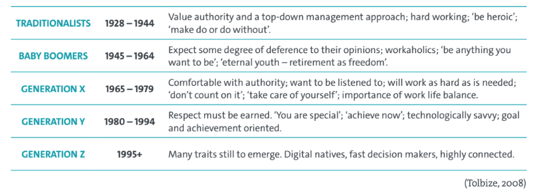How To Effectively Lead A Multi-Generational Church Staff
By: Vanderbloemen

Tania Lennon of The Hay Group, an international corporate leadership development consulting company, recently published one of the best studies on the multi-generational workforce that I’ve seen.
Her team studied over 2,500 executives around the world spanning five generations: Traditionalists, Baby Boomers, Generation X, Generation Y, and Generation Z.
They were asked about what they valued in the workplace, and it turned out that there were quite a few differences in answers between the generations.
 Photo taken from report by The Hay Group.
Photo taken from report by The Hay Group.
So what does this corporate study have to do with the church? A lot.
In John Ortberg’s 2009 Christianity Today article, The Gap, he retells the 2 Chronicles 10 story of Rehoboam taking over his father’s flock and says, “…it is striking that even in the Bible, one of the ways that human community becomes disrupted is the generational divide. If the generational divide was a gap then, it is a canyon now.”
The generational canyon John Ortberg refers to in 2009 is now the Grand Canyon of staffing issues in 2016, as millennials have officially surpassed Baby Boomers as the largest generations, leaving Generation X in the valley of the canyon of the smallest generation in the workforce, according to Pew Research.
In our Vanderbloemen Academy lesson on this subject, William Vanderbloemen discusses what he calls the “double humped camel” problem in the workforce today that has caused friction on church leadership teams. He describes the reality that there are more Baby Boomers and Millennials in the workforce than the Gen X generation, which is why multi-generational leadership skills are vital to church leaders that want to foster personal leadership growth in their teams.
In our work with churches around the world, one of the biggest challenges we hear church leaders face regarding staffing is a) finding high-capacity staff members in all generations and b) fostering unity and development among the different generations on the team.
What I hear from many Baby Boomer church leaders is, “I’m so frustrated with the millennials on our team. They’re lazy and unmotivated.” What I hear from millennial church leaders is, “I’m so frustrated with the baby boomers on our team. They’re resistant to change and out of touch with how the world is changing.”
But when you look at the data Lennon presents in the report, it turns out that generations might be more similar than we think when it comes to expectations in the workplace.
The report found five themes emerge as being most important to people, regardless of age:
- Focus on customers and external stakeholders
- Focus on execution
- Teamwork
- Decision-making
- Planning and organizing
Lennon says, “These priorities reflect the challenges of managing in today’s matrixed and network organizations. A deft blend of drive, working with others, and external focus is seen to be key to leadership success.”
So my challenge for us as ministry leaders is to reflect on our adaptability and ourselves as leaders before we blame one generation or another for the silos we see in our ministry teams.
Ask yourself the following questions:
1. Am I leading my individual team members the same or differently?
Lennon says, “Leaders don't need to develop generation specific skills. They should be able to adapt leadership styles to suit the individual.”
I love this point because it forces the leader to self-reflect and own consider their responsibility in developing their team members, regardless of the team member’s age. This question applies to both leaders who are leading people older than them and younger than them, which both pose unique challenges. The reality is that leadership development is not formulaic and should be customized depending on who you’re leading.
2. Am I delegating tasks or responsibility?
Many leaders are great at passing off tasks to their team members, thinking they are building up leaders. But the reality is that there is a big difference between delegating tasks and responsibility.
As I stated above, the report said that everyone across generations values decision making in his or her work. Be intentional about delegating responsibility to your team members, and if you don’t trust them to own the responsibility, then it might be time to reflect on whether or not they should be on the team.
3. Am I fostering opportunities for cross-team & multigenerational collaboration?
Collaboration is one of the keys to creating a contagious staff culture. Silos and cliques can cause distrust and tension among teams. Regardless of your church staff, be intentional about creating opportunities for your team to work together, especially if you have teams that have more of one generation represented than another.
I also recommend planning multi-generational events outside of work. Plan a staff dinner or game night where your team can get to know each other outside of work. You’ll see the productivity on your team skyrocket if they genuinely like each other.
These are just three questions to get you started in reflecting on your self-awareness as a multigenerational leader and strive to develop your team members, regardless of age.
What other insights have you found helpful in leading a multi-generational staff?





